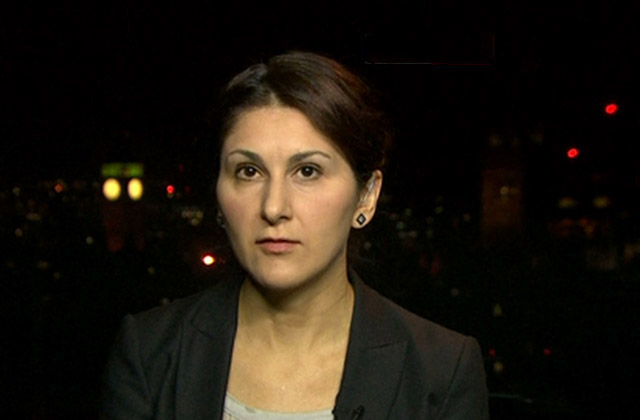“Resumption of a short-term, but bloody war in Karabakh is in the interests of Russia”

Interview with Lilit Gevorgyan, Russia and CIS, Europe senior analyst at IHS Global Insight.
Diplomatic activeness following the April War and the process of implementation of agreement anticipated from that activeness, and generally negotiations are at a deadlock, the situation on the contact line is rather tense, recently the Azerbaijani side launched another attack, new regional and extra-regional developments are observed. At which stage is the situation around NK conflict and what developments are anticipated both on the contact line and in negotiations?
Basically, there are no negotiations. The only essential discussion recorded during negotiations was in recent 12 months proposed by the West, on installation of security mechanisms, which Azerbaijan and Russia successfully failed. This created ground for a new war. Azerbaijan prepared for attack. Both NK and analysis of incidents of Armenian borders show that Baku is implementing reconnaissance-preparation works.
Unfortunately war seems inevitable. In near future Azerbaijan will attempt to undertake another wide-scale, but a short term attack, this time already using lessons learned from the April War. Currently Azerbaijan’s top issue is taking larger territories, in all likelihood, to the southeast of the contact line. Although Azerbaijani military strategy probably will surprise Armenia and Karabakh.
Defensive tactics and foreign policy of the Armenian side were powerless to make Aliyev suspend the war of exhaustion throughout recent one year. This is a type of non-declared war, under which borders are constantly attacked, and which is accompanied by human losses. From time to time wide-scale attack is launched as well, like e.g. in April 2016, to acquire territories. Through so-called “creepy” progress Azerbaijan is establishing a new reality on the conflict zone, urging Armenia its desired conflict resolution.
Can the ultimate goal be lasting as well on account of Azerbaijan’s economic decline and manat depreciation in the last two years, which, according to some analysts, refrains Azerbaijan from wide-scale operations?
Through a successful war Azerbaijan may reach a few purposes. First, Azerbaijanis’ discontent due to high prices and anticipated income will decrease. This is a proven method, e.g. almost after the shift to “free float” regime of manat in January 2016 the so-called “bread protests” have been launched in different regions of Azerbaijan against rise in price. After the 2016 April War Aliyev’s rating sharply rose.
Second, upon recent Constitutional reforms Aliyev undertakes concrete steps to keep country’s leadership exclusively in hands of his family. Successful war will give Aliyev necessary social support to prevent possible chamber reforms. And finally, recent April War uncovered a range of good and hidden weaknesses of the Armenian side, in particular, quality of military and diplomatic ties.
For almost a year, since April, obviously serious changes haven’t been recorded regarding both military and external influence, which would urge Azerbaijan to review its military plans. Moreover, Armenia’s domestic policy situation, recent staff changes, as well as Armenia’s external military policy can in no way restrain Azerbaijan. Baku has taken a more bellicose position, which supposes that Armenia’s post-April efforts, e.g. closer military integration with Russia couldn’t contribute to security of the Armenian side. In short, the Armenian side continues being vulnerable, and Aliyev intends to use shortcomings of Armenian authorities.
What role does Moscow have under current state of affairs, which, based on some information, attempts to organize a ministerial meeting between Armenia and Azerbaijan, having a parallel plan, however, those initiative basically didn’t come into life? On account of high distrust toward Moscow both in Yerevan and Baku, to which extent will Moscow succeed to urge its programs to the parties to the conflict?
I’m not sure which new plan Moscow has. However, it’s clear, that Moscow intends to have mediation monopoly of NK conflict, maybe somewhat copying the USA in Arabic-Israeli conflict. This monopoly is important to use the conflict for Russian purposes. In a wider sense Russian foreign policy is targeted at becoming a superpower, which like in the 19th century, will have its zone of influence, i.e. post-Soviet countries. Eurasian Economic Union (EEU) is a tool to re-establish this zone of influence.
Armenia is a successful example in the South Caucasus for Moscow, regarding how satellite countries have been established. Moscow would like to apply this model on other post-Soviet countries, including Azerbaijan. Crucial components for establishing Russian satellite are: deployment of Russian military base, in particular, in the field of energy and easy-to-govern and Russia-loyal regime, as well as possessing one or a few opposition parties and a media outlet.
Bringing Azerbaijan to EEU will be a perfect victory for Azerbaijan. However, it’s difficult to urge Azerbaijan. Baku is pursuing independent policy for more than two decades, and Russian capital in the country seriously concedes Western investments. But NK conflict provides a good opportunity for Moscow-Baku deal.
In this regard, resumption of a new short-term, but bloody war in Karabakh comes from interests of very Russia. This possible new clash will again end with Moscow’s mediation to reconfirm that Russia is the stabilizing power in the region. This will be a commandment both to the conflicting parties and the EU and the USA. It’ll also clarify the attitude of new American regime toward NK conflict. In case of the US passiveness Russia will more activate integration process with Azerbaijan.
Key to these negotiations will be NK status, where Moscow and Baku will attempt to find an acceptable option: it isn’t excluded that it’ll be through Azerbaijan’s federalization. In case of this scenario Moscow, in all likelihood, will provide its military presence in NK. However, if the USA takes a more passive mediation role to prevent possible large-scale war, then Minsk Group will provide Russia the opportunity and the USA to work jointly within Madrid/Lavrov plan. Such cooperation with the USA is crucial for Putin, who is still in isolation by the West.
By Araks Martirosyan

























